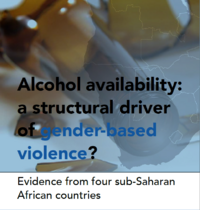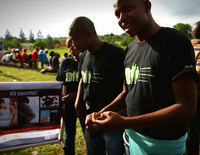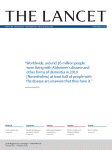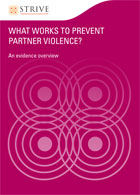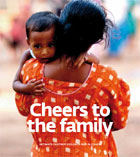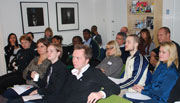Alcohol and gender
Generally, throughout the world, men consume more alcohol and cause more problems related to that drinking than women. Studies from around the globe reveal that intimate partner violence and alcohol are often intricately related problems. Nonetheless, there’s little evidence of a causative relationship between the two and the nature of the association is complex. This observation is the starting point of the booklet “Cheers to the Family,” which addresses intimate partner violence and alcohol issues.
Evidence review from Southern Africa
Alcohol availability - a key issue in gender-based violence
Alcohol consumption is a key structural driver of gender-based violence (GBV) and especially intimate partner violence (IPV). A new report from four countries in sub-Sahara Africa explores how the availability of alcohol – both alcohol outlet density and trading times – are associated with increased alcohol use, and increased risk for GBV perpetration and vicitimisation.
New films on alcohol and masculinity
Sonke Gender Justice, a South African NGO, has produced thee short documentaries chronicling the lives of three young men who , among other things, reflect on issues around alcohol and masculinity. Now they are peer educators for Sonke.
International charter on the prevention of fetal alcohol spectrum disorder
Urgent action is needed to prevent more children from acquiring disorders due to mother’s alcohol consumption during pregnancy. This is the appeal from the first international conference on prevention of foetal alcohol spectrum disorders, held in Edmonton, AB, Canada, on Sept 23—25, 2013.
The MenEngage Alliance calls for effective policies to reduce harmful drinking
In its Call for Action to the Commission on the Status of Women in 2013, the global MenEngage alliance defined policies to decrease alcohol consumption as one of ten priority areas of action to reduce violence against women.
New report on intimate partner violence and alcohol use
A new evidence overview points at excessive alcohol consumption as one the key drivers behind intimate partner violence. The report is written by senior lecturer Lori Heise at the London School of Hygiene and Tropical Medicine.
Alcohol nourishes gender-based violence in Rwanda
Every third man who has been drinking alcohol beats his partner according to a study in Rwanda from 2010. The cultural norm constituted in a society like Rwanda is that the man decides, men dominate. It is a characteristic for many countries in Africa where women's rights remain subordinate to those of their husbands.
Publication on intimate partner violence and alcohol
Cheers to the family
No society is immune from intimate partner violence. Alcohol plays a significant role in those tragic events, breeding violence from the combination of intoxication with ill-conceived images of masculinity and repressive social norms.
"Reconstructing manhood", Oslo, 26-27 October 2010
Material from the Masculinity Conference in Oslo
Below you will find presentations, material, links and other resources from the conference "Reconstructing manhood", Oslo, 26-27 October 2010:
Men of Quality are not afraid of Equality
This was one of the messages that came out of the conference “Reconstructing Manhood?” which took place in Oslo 26-27 October. The conference was the first of its kind in Norway, presenting experiences from engaging men in developing countries to a Norwegian audience.
One man can!
Men can be mobilized to change men and harmful images of masculinity. Men can be a part of the solution! This was the optimistic message from Kenya and South Africa at a FORUT seminar in Malawi recently.
